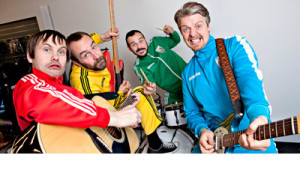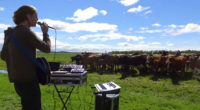
Reykjavík welcomed us and the rest of Iceland once again to the national final of their Söngvakeppnin preselection. Ten acts have been reduced to six over the past two weeks and from the six acts competing tonight, it was Pollapönk that emerged victorious with the song Enga Fordóma.
The line up might be small in Reykjavík tonight, but with recent developments at Icelandic national broadcaster RÚV, both fans and Icelanders alike are actualy fortunate that a contest is being held at all. Following an overall 20% downsizing carried out, the EBU was quick to condemn what it deemed as excessive cuts. Söngvakeppnin was just one of many programmes to be affected by the cuts, which manifested itself in the change of venue for this year and also the number of semi finals held. 2013 saw a reduction from three to two semis, which has been continued this year. We’ve also had to wave goodbye to Harpa as a venue, instead making our way to the much smaller and intimate Háskólabíó (University Cinema). But thankfully, a final there will be, and so six expectant acts take to the stage tonight. competing not only for fame and the honour of representing Iceland in Copenhagen, but equally as important, the ISK 1 million cash prize offered to the victor by RÚV.
The songs:
01. F.U.N.K. – Þangað til ég dey (Until I die) (T & M: Pétur Finnbogason / Franz Ploder Ottósson / Lárus Örn Arnarson)
Manband F.U.N.K. has the honour of kickstarting the Icelandic final tonight with their lively Þangað til ég dey. Singer Franz has changed the outfit that he had on in the semi, opting for a black jacket with white checked patterns on it over a white shirt paired with black pants. The other members minus the drummer are sporting their burgundy jackets over white shirts. The stage started completely black with glimpses of orange before it burst into an orange glow and then flame motifs. This has grown considerably since the first hearing. Franz comes across as really self assured on stage, giving plenty of direct looks into the camera, showing off his boyish good looks and interacting really well with the guitarists on either side of him. He provided a surprisingly good vocal performance of what was actually a rather difficult song to sing, especially the long falsetto note. The other member’s voices merge splendidly with is, creating some fantastic harmonies. The synth solo with the band members jumping in the air had the crowds going wild! If you get to Copenhagen boys, drop the punching in the air – it looks pretty silly. A lively opener that had the audience clapping along from the start.
02. Ásdís María Viðarsdóttir – Amor (Love) (T & M: Haukur Johnson)
Ásdis María, one of the wild card winners is the next act up and provides the cookiness of the evening with her mysterious, dark Amor. The opening was brilliant, with her silhouette seen dancing through dry ice backlight by white rays. Amor manages to differentiate itself from the others on so many levels. Firstly, her outfit and appearance – a rather striking look, sporting black and white stripes across her face, a bit of a mix of native American Indian and partly inspired by Adam Ant it would seem. The outfit and look is completed by a swish, floor length black dress with sheer top half, with long tassles hanging from her sleeves. From the whistled intro, as a viewer and a listener we soon see and hear that Amor has bags of character and individuality, both in terms of structure and arrangement. There is some fantastic camerawork, circling Ásdís María on stage. It is quite stark in sound with a snarling bassline, quite slinky sounding in a way and the sensuality is again reflected in Ásdis María’s performance, with plenty of gesticulation and tons of intensity. Her vocals were sincere, with a distinct lived in sound. The presentation would have perhaps benefitted from a few more intense looks into the camera, but otherwise there was very little to find fault with here.
03. Sigríður Eyrún Friðriksdóttir – Lífið kviknar á ný (Life awakens once more) (T: Sigríður Eyrún Friðriksdóttir / M: Karl Olgeir Olgeirsson)
Sigga Eyrún and her Charleston/gangster sounding Lífið kviknar á ný signals the half way mark in the final. Bearing an outfit slightly reminiscent of Nathalie from Cascada‘s last year topped off with a flowing beige chiffon cape, Sigga Eyrún struts her way around the stage flanked by her two dancers in thirties inspired garb, complete with black plumed headdresses and matching fans, looking as if they’d been lifted from Moulin Rouge. Her three backing singers start by standing behind in similarly inspired outfits, but with dangly earrings in vibrant colours; they move to the side of the stage. This is another lively number that really swings and gets your toes tapping and engages you with its playful style. They really make good use of the stage which comes across fantastically on camera. There are som aerial views of the three before they launch into the key change and the wind machine is put to use. Sigga Eyrún did a really good job of performing this, giving her all – well done!
04. Gissur Páll Gissurarson – Von (Hope) (T & M: Jóhann Helgason)
The fourth act out is classically trained tenor Gissur Páll and his appeal to all the romantics out there, Von. He comes across as very stout and serious looking in his sharp black jacket and white shirt. The stage was softly lit with white tones and pink LED columns to the rear. Vocally, he is another who cannot be faulted – he is pitch perfect, his diction is polished and breathing controlled, making his voice a powerful and crystal clear medium. But Gissur Páll’s entry has one major flaw – and that is the fact that Von is about thirty years too late – this should have been in the contest in the seventies and might just not be enough to cut it with today’s viewer. Hopelessly outdated, even the lush, tender sound of the spanish guitar and the gentle tinkling of the ivories as well as the countless key changes fail to lift this one out of the quagrmire of boredom which many will use as either a toilet break or to pour themselves another glass of wine. The audience seemed to lap it up, however.
05. Greta Mjöll Samúelsdóttir – Eftir eitt lag (After one song) (T:Bergrún Íris Sævarsdóttir / M: Ásta Björg Björgvinsdóttir)
Next up is a slice of sunny spice and charm in the shape of Greta Mjöll strumming her eukelele while singing Eftir eitt lag. Her platinum hair shines beautifully under the spotlights, and her outfit choice for the evening is a turquoise coloured thigh length dress, the same she wore in the semi final. She walks onto the stage through a cloud of dry ice, the stage lit by soft, diffused blue tones from above which quickly change to orange hues. She is accompanied by two ladies on guitar and accordion as well as another woman sitting atop a box drum. If winter was drab, dark and cold in Reykjavík, this is swiftly banished as Greta Mjöll serves up the playfully, exhiliaratingly innocent lilting slice of Meditteranean joy, which wouldn’t have sounded out of place in a Portuguese final. Vocally, Greta Mjöll seemed a little restrained. but it didn’t detract from the performance whatsoever. Eftir eitt lag has echoes of Jack Johnson’s Upside Down about it and is brimming with just as much cheer. You can’t fail to be swept along by the wave of happiness that follows this – it should be bottled and sold as an alternative to Prozac. This just exudes a party atmosphere and would come across extremely well on stage in Copenhagen and it quickly found many fans among the audience who were whopping and hollering by the end.
06. Pollapönk – Enga fordóma (No prejudices) (T & M: Arnar Gíslason / Guðni Finnsson / Haraldur F. Gíslason / Heiðar Arnar Kristjánsson)
The men in Pollapönk have a lot to answer for. Arnar, Guðni, Haraldur and Heiðar perform their song Enga fordóma which in essence is a protest song of sorts coming across as the most amateurish act of the evening. Just what is the point of bringing a song with a solemn underlying message to a final when it will be failed to be taken seriously with such a presentation? Opening shots show a sarkened stage lit by rays before the LED screens awaken, flashing white and black. They may have personalized tracksuits, but they look more like men approaching a mid life crisis. With them, they had two male backing singers kitted out in similarly hideous tracksuits. In the build up to the lasy chorus the song gets a funky seventies vibe with wah wah guitars which had the crowds cheering loudly ,but vocals, if you can call them that simply became shouting and so aggressive towards the end. There’s no denying that the chorus and the stuttering does make you smirk, but the whole package just ends up coming across as yet another novelty act that would fail to translate and undoubtedly die a death and of Iceland is to send this, then something would definitely be rotten in the state of Denmark.
The show:
Before the show got going, we were treated to a humouristic behind the scenes lightning trip of the DR headquarters in Copenhagen, before RÚV’s presenters Fannar and Benni were sent on to the streets of the Danish capital to ask people to give their opinions of pictures of tonight’s performers. Back in Háskólabíó, last year’s second placed Unnur Eggertsdóttir was invterviewed briefly about her experiences, being asked the rather tactless question of where she had gotten over the defeat yet. She wouldn’t say who she thought would win, but does enjoy the entry from F.U.N.K.
Hosts Ragnhildur Steinunn Jónsdóttir and Guðrún Dís Emilsdóttir were escorted to the stage by their male cohorts this evening, looking very posh indeed, all dolled up to the nines. Ragnhildur Steinunn was wearing a turquoise dress with lots og gold appliqué and beadwork and Guðrún Dís was wearing a modern, more informal shiny black dress over black tights.
Each act was introduced by postcards showing short interviews with them prior to the final, showing amongst other things singer Franz from F.U.N.K. being mobbed by schoolkids. Home footage of Ásdís María had the audience in stitches at one point. We even got to see Gissur Páll as a child star in The Sound of Music and members of Pollapönk larking around with kids in the playground. Following the third act, it was time for a brief detour to the green room, where the first three acts were interviewed.As expected, Sigga Eyrun had thoroughly enjoyed herself on stage, she told the reporters. After the final act, we were transported back to the green room to finish interviewing all of the participants.
While the lines were open for voting, we were treated to yet another visit to Copenhagen, where RÚV interviewed the 2000 winners, the Olsen Brothers, with one of the reporters trying to enlist Jørgen Olsen as his stepfather and fixing him up with his mum back in Iceland! While waiting for the votes to come in, we were in for a rare treat, getting to see some archive material of former entrants, featuring the writer of Hægt og hljótt (Halla Margret, 1987) and Regina Ósk (Eurobandið, 2008) before looking back on Eyþór Ingi’s experiences in Malmö.
The voting:
Both viewers and jurors alike will vote on tonight’s six contenders in the first round of voting, each constituting half of the result. The top two placed acts will then proceed on to a super final, but new for this year is that the songs in the super final will have to be performed in the language that they will be sung in in Copenhagen. Only televotes will be used to determine the outright winner of tonight’s contest.
Following a quick recap, we were informed that the lines were closed and that the results were ready. We were also informed of the new superfinal rule regarding the performance language. The first superfinalist to be announced was Pollapönk with Enga fordóma. The second act to make the grade was Sigga Eyrun with Lífið kviknar á ný. She was the first to perform in the superfinal, choosing the english version of her song, titled Up and away.
Pollapönk were the last to perform and they decided to stick with the original Icelandic version of their entry Enga fordóma, with the last half sung in English. Thankfully, they’d changed their tracksuits for much smarter suits and bowties in the same colours of their original tracksuits. Lines were opened once more once their entry had been performed, with a 10 minute window to vote in. While we were waiting for the results to be announced, we had a chatshow like scenario on stage with amongst others Hrafnhildur Halldórsdóttir and Felix Bergsson, who have been part of the Icelandic delegation the last few years. Felix was able to confirm that the preview show Alla Leið will be broadcast this year on RÚV also.
After what seemed like an eternity due to nerves, the winner of the two was announced and it was Pollapönk who had managed to win the Icelandic ticket to Copenhagen!
Iceland at the Eurovision Song Contest:
The small nation of Iceland was the last of the Nordics to make its debut in 1986 with the imaginatively named trio ICY and the entry Gleðibankinn
(Bank of fun), finishing 16th. Icelanders have embraced the contest
wholeheartedly and the first few years of their participation became
practically a national obsession. Often finishing mid field, Iceland has
however sent some noteable entries – in 1990, they had their first real
taste of success ending fourth with the bouncy Eitt Lag Enn (One More Song) by Stjórnin. Artist Sigga Beinteinsdóttir has gone on to represent Iceland two more times – in 1992 as part of Heart 2 Heart, finishing a respectable 7th place with the infuriatingly catchy Nei eða já and in 1994 with the much acclaimed ballad Nætur, coming in 12th. They have come tantalisingly close to winning the gold medal on two occasions – in 1999, when Selma and All Out of Luck was pipped at the post and ten years later, in 2009 with Jóhanna and her mournful balad Is It True?. This year will be their 27th participation at the contest.



















